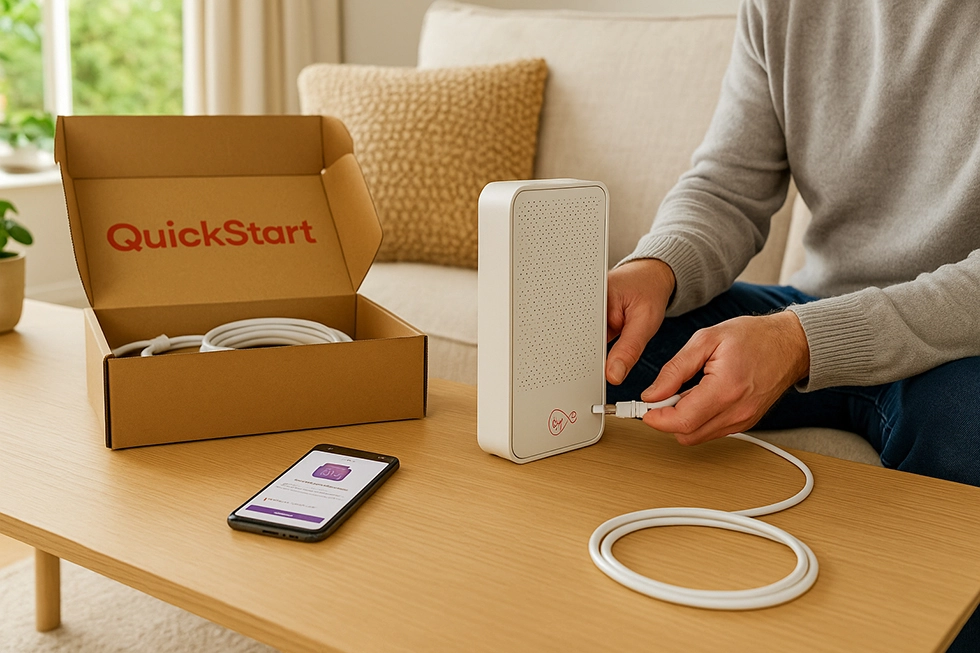Out-of-Contract Broadband Prices: UK Providers Compared
Most broadband deals in the UK come with a discounted monthly price for the first 12, 18, or 24 months. When this contract ends, providers move customers onto a rolling monthly rate, often called the out-of-contract, post-contract, or standard monthly price. These standard prices are almost always higher.
Examples:
- Virgin Media M250: £35.99 per month ( £68 after 24 months)
- Sky Full Fibre 150: £27 per month (£43–£49 after 24 months)

Why it happens – Understanding the pricing jump
Out-of-contract price rises aren’t accidental. They’re a built-in feature of how most broadband deals in the UK are structured — particularly by major providers. Here’s what drives this pricing model, and why it impacts your bill once your initial contract ends.
Initial term discounts are promotional
The first 12, 18 or 24 months of a broadband plan are often heavily discounted as part of a promotional offer. This discount is designed to attract new customers and make the monthly cost look competitive compared to rival deals.
Once that period ends, the discount expires — and the price reverts to what the provider considers the “standard monthly price”.
However, UK regulator Ofcom has required ISPs to:
- Send End of Contract Notifications (ECNs) at least 10–40 days before a contract ends
- Show the best deals available at that point
This helps the customers:
- Track when their contract ends
- Compare alternative deals
- Contact the provider to recontract or switch
Who Stays Gentle and Who Gets Pricey
While some providers continue your service with modest price rise, others apply much steeper standard pricing — sometimes more than £25 higher.
Below is a comparison of milder vs steeper post-contract increases, helping you find which providers you might want to stay with vs switch away from.
Milder Price Increases
These providers have relatively small price increases or none at all:
Vodafone
- Example: Full Fibre 150: £27 to £32
- Only £5 increase; service continues monthly unless you renew
Hyperoptic
- Example: 150Mb: £20–£23 to £23
- Continues on monthly basis without sharp rise
Hey!Broadband
- Example: 150Mb: £23–£25 to £28
- Transparent pricing with only £3–£5 rise
- Rolling monthly pricing that doesn’t leap after term
BRSK
- Example: 500Mb: £25 to £35
- Still reasonable compared to Openreach providers
- You pay about £10 more post-contract but remains competitive
Zzoomm
- Example: 500Mb: £25 to £37
- Increase is around £12, but still cheaper than many FTTP rivals
- Predictable monthly pricing after contract ends
BeFibre
- Example: 900Mb: £29 to £40
- Increases by £11, but stays below BT/Virgin prices for similar speeds
Steeper Price Rises After the Contract Ends
These providers are known for large jumps when your initial term ends:
Virgin Media
- M250: £35.99 to £68
- M500: £42 to £72
- Price nearly doubles after 24 months. The biggest jump in the market.
Sky Broadband
- Full Fibre 150: £27 to £49
- Gigafast: £42 to £56
- Increases can be £15–£22, depending on the plan. You must re-contract to avoid it.
Onestream
- FTTP 550Mb: £25.95 to £54.95
- One of the highest % increases after contract
KCOM (Hull area)
- 900Mb: £44.99 to £59.99
- £15 increase unless you switch or re-contract
FibreNest (on Persimmon homes)
- 500Mb: £35 to £47
- £12 increase across most tiers, with limited flexibility
Moderate Price Rises
Some providers have a blend of low initial rates and moderate post-term prices:
YouFibre
- 1Gb: £29.99 to £44.99
- £15 more, but still among the cheapest gigabit options after contract
4th Utility
- 1Gb: £35 to £45
- Not a huge jump, still decent for 1Gbps plan
BT
- Price increase after contract varies by plan
- Typically rises by £8–£15 per month
- Often unclear, re-contracting is recommended
Tip: Select a provider from the Reviews menu to see the latest prices and deals.
Can You Avoid These Price Rises?
Most broadband customers don’t realise their bills have quietly increased until a direct debit reveals it. Out-of-contract pricing is one of the easiest ways broadband providers boost revenue — but it’s avoidable with a few smart steps.
Recontract before your term ends
If you’re happy with your provider, don’t wait until the bill goes up. Most allow you to renew early — usually within the final 10 to 40 days of your term. Doing so can lock you back into promotional pricing for another 12, 18, or 24 months.
- Example: With Vodafone, if your 24-month plan is ending, you can usually recontract into another 24-month deal at new customer prices or at least with a modest uplift — often saving £5–£10/month over the standard rolling rate.
- Tip: Don’t assume recontracting will happen automatically. You need to manually accept new terms or switch to a new plan.
Switch providers
In many cases, switching is the best option — especially when your current provider’s rolling price is more expensive than competitors’ deals by £15 or more. Ofcom’s rules make switching between Openreach providers (e.g., BT, Plusnet, Sky, Vodafone, TalkTalk) very straightforward.
- Broadband-only – Alt-nets like Zzoomm, BeFibre, and brsk often provide better deals with smaller or no post-term jumps.
- Broadband Bundle – Using TV or landline with broadband? Then, switching requires careful planning.
You get these incentives when you switch:
- Free setup or no activation fee
- Gift cards or vouchers (£50–£155)
- Better routers (Wi-Fi 6E or mesh systems)
Use your cooling-off window if you forget
Even if you forget to cancel before your minimum term ends, most providers offer a 14-day cooling-off period when you sign a new contract. If you re-sign into an expensive out-of-contract plan or don’t realise the price has increased, you can still back out.
- If you find any issues, you can change your mind and switch or renegotiate.
- This is particularly useful if your provider attempts to upsell a plan that’s not competitively priced.
Set a contract-end reminder
It sounds basic, but it works. Mark the end date of your contract in your phone or calendar. Give yourself a 30-day alert to start comparing prices.
- Vodafone and Hyperoptic clearly show contract end dates in their dashboards.
- BT and Sky often notify you by email, but not always with clear pricing — so it pays to check proactively.
Contract Lengths and Price Predictability
Most UK broadband deals come with 12, 18, or 24-month contracts, with the majority now defaulting to 24-month terms. While longer contracts typically come with better pricing, they also require a bit more forward planning — especially as providers now apply scheduled annual price rises.
12-month contracts: More flexible, less value
Shorter-term contracts are usually priced higher per month. While they give you more freedom to switch or cancel, you’ll rarely find the cheapest deals on 12-month terms.
For example:
- Vodafone Full Fibre 100 (12 months): £28/month
- Vodafone Full Fibre 100 (24 months): £25/month
18-month contracts: Midway, but less common
18-month terms were once standard across most providers including BT, Virgin Media and TalkTalk. In 2025, they are being replaced with 24-month deals.
24-month contracts: Best pricing, but with annual increases
Almost all major deals from BT, Sky, Virgin Media, Vodafone, TalkTalk, Plusnet, and EE are now 24 months. They come with the lowest monthly prices and free setup, but most apply mid-contract price rises every April.
Providers like BT, Sky, EE, Virgin Media, and Vodafone apply mid-contract price rises while providers like Community Fibre, Hyperoptic, BeFibre, YouFibre, Zzoomm apply no annual price rises.
Are No-Contract Deals Worth It?
Rolling Monthly Broadband is often preferred by students, renters, or those in temporary housing. These plans allow you to cancel at any time without exit fees — but they usually come with higher monthly costs and fewer perks.
What is rolling monthly broadband?
A rolling or one month or no-contract broadband allow you pay on a monthly basis with no long-term commitment. You’re free to cancel at any time, usually with 30 days’ notice.
Pros of rolling contracts
- Ideal for short-term stays or people expecting to move soon.
- You can leave at any time without paying exit fee.
- Fast installation.
Cons of rolling contracts
- Usually £5–£15 more per month than the same plan on a fixed term.
- Providers charge £10–£35 for router delivery or activation.
- Not all providers offer rolling broadband plans.
FAQ
What happens when my broadband contract ends?
You’re usually moved to a rolling monthly price, which is often much higher than your discounted contract rate.
How much more will I pay after my contract ends?
It depends on the provider, but increases of £10–£30/month are common — some plans even double in price.
Which UK providers have the highest price jump after contract?
Virgin Media, Sky, and Onestream have some of the steepest increases, often £20–£35 more per month.
Are there providers that don’t raise prices much after contract?
Yes. Vodafone, Hyperoptic, and Hey!Broadband tend to have softer or no abrupt increases.
Can I avoid the out-of-contract price rise?
Yes — either by recontracting with your provider or switching to a new one before your deal ends.
When can I recontract with my provider?
Most allow you to renew 30 to 90 days before your term ends, but you must actively confirm the new deal.
Will I get new customer pricing when I recontract?
Sometimes. Providers like Vodafone often offer similar rates, while others may only offer smaller discounts.
Is switching broadband providers difficult?
No — if you’re on Openreach or CityFibre networks, the switch is usually smooth and handled for you.
Do I have to give notice to cancel broadband?
Yes. Most providers require 14–30 days’ notice before disconnection, unless you’re switching via the same network.
Does staying out of contract mean more flexibility?
Yes, but it also means paying more each month. Flexibility costs extra unless you’re on a rolling plan by design.
Are out-of-contract prices listed clearly?
Not always. Some providers bury them in T&Cs or post them after login. Always check before your deal ends.
Can I negotiate my broadband price after my deal ends?
Yes. Calling your provider and asking for a better rate often leads to a discount or retention deal.
Which providers offer flat or rolling pricing from the start?
Hyperoptic and Zen Internet often have flat-rate or flexible options with no sudden increase.
What are the typical contract lengths in the UK?
Most deals are 12, 18 or 24 months long. Some altnets and new providers offer 1-month rolling contracts.
Do TV or phone bundles affect out-of-contract pricing?
Yes. Sky and Virgin bundles can make switching more complex and their rolling prices even higher.
How can I track when my contract ends?
Check your account dashboard or contact customer service. Ofcom also requires providers to notify you in advance.
Will I face early exit fees if I switch?
Only if you’re still in contract. Once your minimum term ends, you can leave without penalty.
Do out-of-contract prices go up every April too?
Yes. Annual CPI or fixed rises may still apply unless you’re on a new fixed-price deal.
Is switching worth it even for a £5–£10 saving?
Yes. Over a year, even small monthly savings can add up to £60–£120.
How can I find the best current deal for my postcode?
Use our broadband postcode checker to see what’s available at your address.
